Reflective Essay on Nursing Leadership & Management: 3977NRS Griffith
VerifiedAdded on 2023/04/24
|8
|2173
|289
Essay
AI Summary
This reflective essay delves into a nursing supervisor's experience in handling a registered nurse's management of an alcoholic patient, utilizing Gibb's reflective model for analysis. The reflection covers the description of the incident, the supervisor's feelings, an evaluation of the situation, a detailed analysis of leadership styles employed, a conclusion summarizing key learnings, and an action plan for future scenarios. The essay highlights the importance of clinical leadership, evidence-based practice, and continuous professional development in nursing. It emphasizes the application of coaching, autocratic, and situational leadership styles in managing critical clinical situations and the importance of learning from past experiences to improve future practice. The essay concludes with actionable steps for enhancing leadership skills and promoting awareness of alcohol addiction treatments.
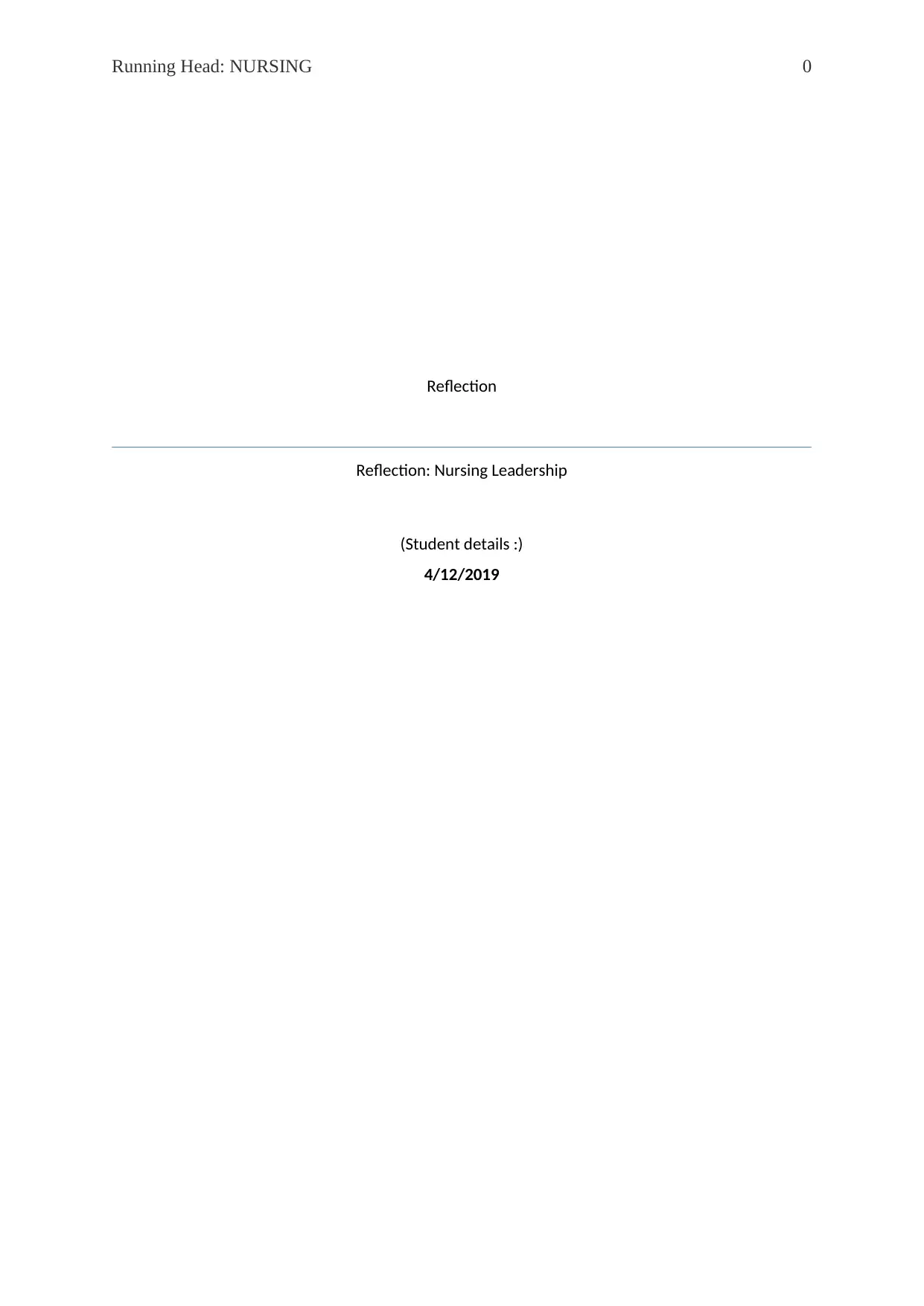
Running Head: NURSING 0
Reflection
Reflection: Nursing Leadership
(Student details :)
4/12/2019
Reflection
Reflection: Nursing Leadership
(Student details :)
4/12/2019
Paraphrase This Document
Need a fresh take? Get an instant paraphrase of this document with our AI Paraphraser
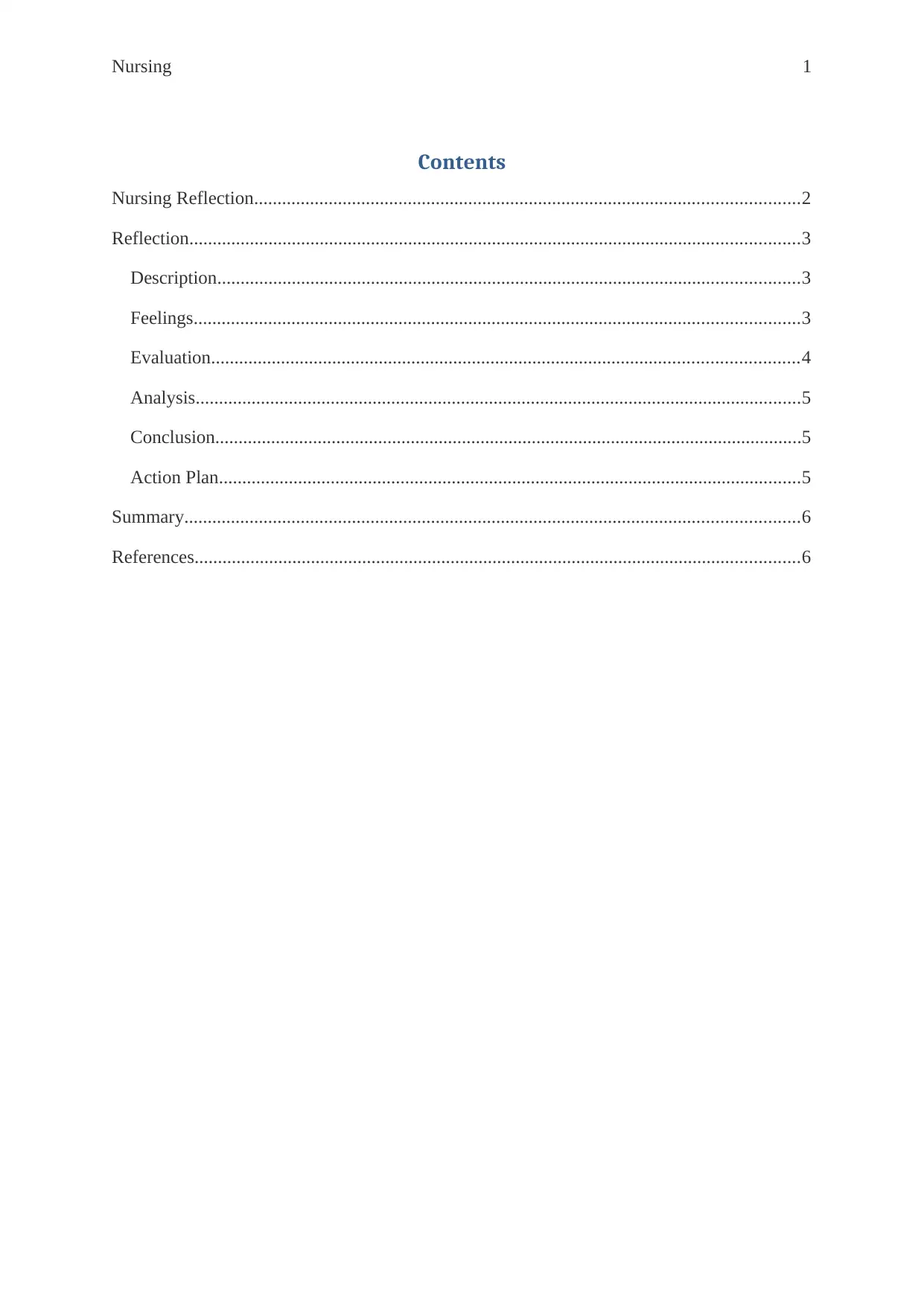
Nursing 1
Contents
Nursing Reflection.....................................................................................................................2
Reflection...................................................................................................................................3
Description.............................................................................................................................3
Feelings..................................................................................................................................3
Evaluation..............................................................................................................................4
Analysis..................................................................................................................................5
Conclusion..............................................................................................................................5
Action Plan.............................................................................................................................5
Summary....................................................................................................................................6
References..................................................................................................................................6
Contents
Nursing Reflection.....................................................................................................................2
Reflection...................................................................................................................................3
Description.............................................................................................................................3
Feelings..................................................................................................................................3
Evaluation..............................................................................................................................4
Analysis..................................................................................................................................5
Conclusion..............................................................................................................................5
Action Plan.............................................................................................................................5
Summary....................................................................................................................................6
References..................................................................................................................................6
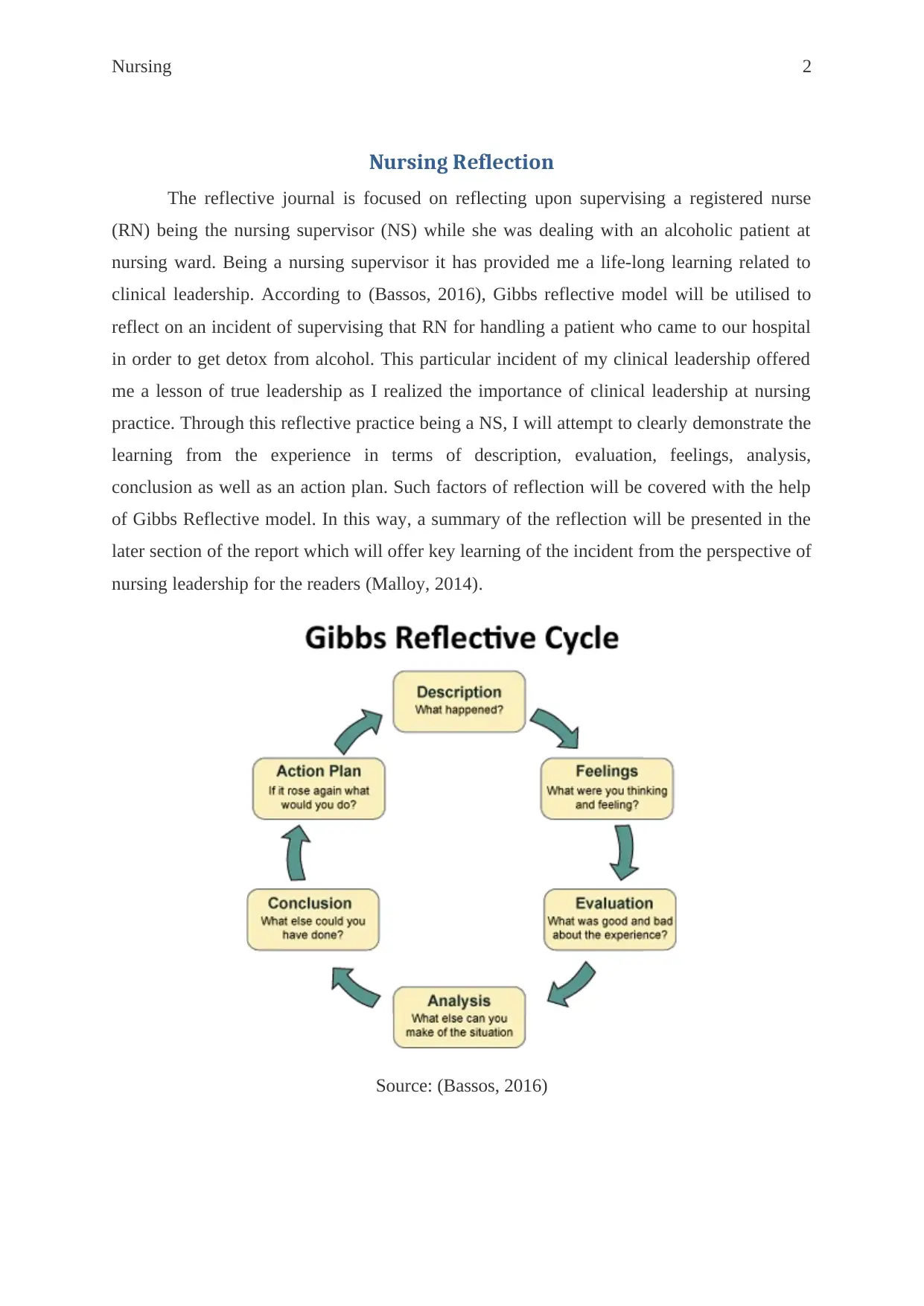
Nursing 2
Nursing Reflection
The reflective journal is focused on reflecting upon supervising a registered nurse
(RN) being the nursing supervisor (NS) while she was dealing with an alcoholic patient at
nursing ward. Being a nursing supervisor it has provided me a life-long learning related to
clinical leadership. According to (Bassos, 2016), Gibbs reflective model will be utilised to
reflect on an incident of supervising that RN for handling a patient who came to our hospital
in order to get detox from alcohol. This particular incident of my clinical leadership offered
me a lesson of true leadership as I realized the importance of clinical leadership at nursing
practice. Through this reflective practice being a NS, I will attempt to clearly demonstrate the
learning from the experience in terms of description, evaluation, feelings, analysis,
conclusion as well as an action plan. Such factors of reflection will be covered with the help
of Gibbs Reflective model. In this way, a summary of the reflection will be presented in the
later section of the report which will offer key learning of the incident from the perspective of
nursing leadership for the readers (Malloy, 2014).
Source: (Bassos, 2016)
Nursing Reflection
The reflective journal is focused on reflecting upon supervising a registered nurse
(RN) being the nursing supervisor (NS) while she was dealing with an alcoholic patient at
nursing ward. Being a nursing supervisor it has provided me a life-long learning related to
clinical leadership. According to (Bassos, 2016), Gibbs reflective model will be utilised to
reflect on an incident of supervising that RN for handling a patient who came to our hospital
in order to get detox from alcohol. This particular incident of my clinical leadership offered
me a lesson of true leadership as I realized the importance of clinical leadership at nursing
practice. Through this reflective practice being a NS, I will attempt to clearly demonstrate the
learning from the experience in terms of description, evaluation, feelings, analysis,
conclusion as well as an action plan. Such factors of reflection will be covered with the help
of Gibbs Reflective model. In this way, a summary of the reflection will be presented in the
later section of the report which will offer key learning of the incident from the perspective of
nursing leadership for the readers (Malloy, 2014).
Source: (Bassos, 2016)
⊘ This is a preview!⊘
Do you want full access?
Subscribe today to unlock all pages.

Trusted by 1+ million students worldwide
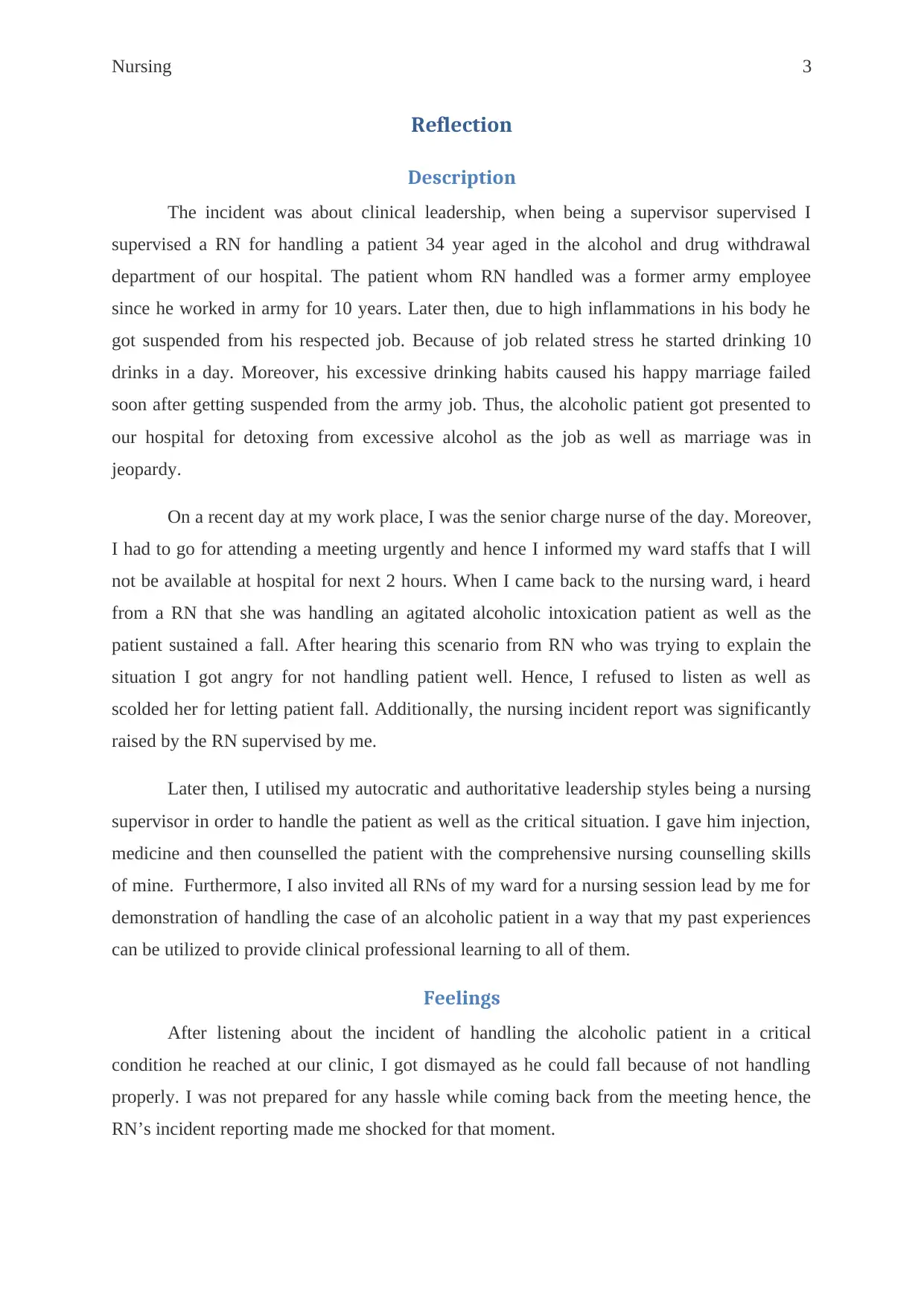
Nursing 3
Reflection
Description
The incident was about clinical leadership, when being a supervisor supervised I
supervised a RN for handling a patient 34 year aged in the alcohol and drug withdrawal
department of our hospital. The patient whom RN handled was a former army employee
since he worked in army for 10 years. Later then, due to high inflammations in his body he
got suspended from his respected job. Because of job related stress he started drinking 10
drinks in a day. Moreover, his excessive drinking habits caused his happy marriage failed
soon after getting suspended from the army job. Thus, the alcoholic patient got presented to
our hospital for detoxing from excessive alcohol as the job as well as marriage was in
jeopardy.
On a recent day at my work place, I was the senior charge nurse of the day. Moreover,
I had to go for attending a meeting urgently and hence I informed my ward staffs that I will
not be available at hospital for next 2 hours. When I came back to the nursing ward, i heard
from a RN that she was handling an agitated alcoholic intoxication patient as well as the
patient sustained a fall. After hearing this scenario from RN who was trying to explain the
situation I got angry for not handling patient well. Hence, I refused to listen as well as
scolded her for letting patient fall. Additionally, the nursing incident report was significantly
raised by the RN supervised by me.
Later then, I utilised my autocratic and authoritative leadership styles being a nursing
supervisor in order to handle the patient as well as the critical situation. I gave him injection,
medicine and then counselled the patient with the comprehensive nursing counselling skills
of mine. Furthermore, I also invited all RNs of my ward for a nursing session lead by me for
demonstration of handling the case of an alcoholic patient in a way that my past experiences
can be utilized to provide clinical professional learning to all of them.
Feelings
After listening about the incident of handling the alcoholic patient in a critical
condition he reached at our clinic, I got dismayed as he could fall because of not handling
properly. I was not prepared for any hassle while coming back from the meeting hence, the
RN’s incident reporting made me shocked for that moment.
Reflection
Description
The incident was about clinical leadership, when being a supervisor supervised I
supervised a RN for handling a patient 34 year aged in the alcohol and drug withdrawal
department of our hospital. The patient whom RN handled was a former army employee
since he worked in army for 10 years. Later then, due to high inflammations in his body he
got suspended from his respected job. Because of job related stress he started drinking 10
drinks in a day. Moreover, his excessive drinking habits caused his happy marriage failed
soon after getting suspended from the army job. Thus, the alcoholic patient got presented to
our hospital for detoxing from excessive alcohol as the job as well as marriage was in
jeopardy.
On a recent day at my work place, I was the senior charge nurse of the day. Moreover,
I had to go for attending a meeting urgently and hence I informed my ward staffs that I will
not be available at hospital for next 2 hours. When I came back to the nursing ward, i heard
from a RN that she was handling an agitated alcoholic intoxication patient as well as the
patient sustained a fall. After hearing this scenario from RN who was trying to explain the
situation I got angry for not handling patient well. Hence, I refused to listen as well as
scolded her for letting patient fall. Additionally, the nursing incident report was significantly
raised by the RN supervised by me.
Later then, I utilised my autocratic and authoritative leadership styles being a nursing
supervisor in order to handle the patient as well as the critical situation. I gave him injection,
medicine and then counselled the patient with the comprehensive nursing counselling skills
of mine. Furthermore, I also invited all RNs of my ward for a nursing session lead by me for
demonstration of handling the case of an alcoholic patient in a way that my past experiences
can be utilized to provide clinical professional learning to all of them.
Feelings
After listening about the incident of handling the alcoholic patient in a critical
condition he reached at our clinic, I got dismayed as he could fall because of not handling
properly. I was not prepared for any hassle while coming back from the meeting hence, the
RN’s incident reporting made me shocked for that moment.
Paraphrase This Document
Need a fresh take? Get an instant paraphrase of this document with our AI Paraphraser
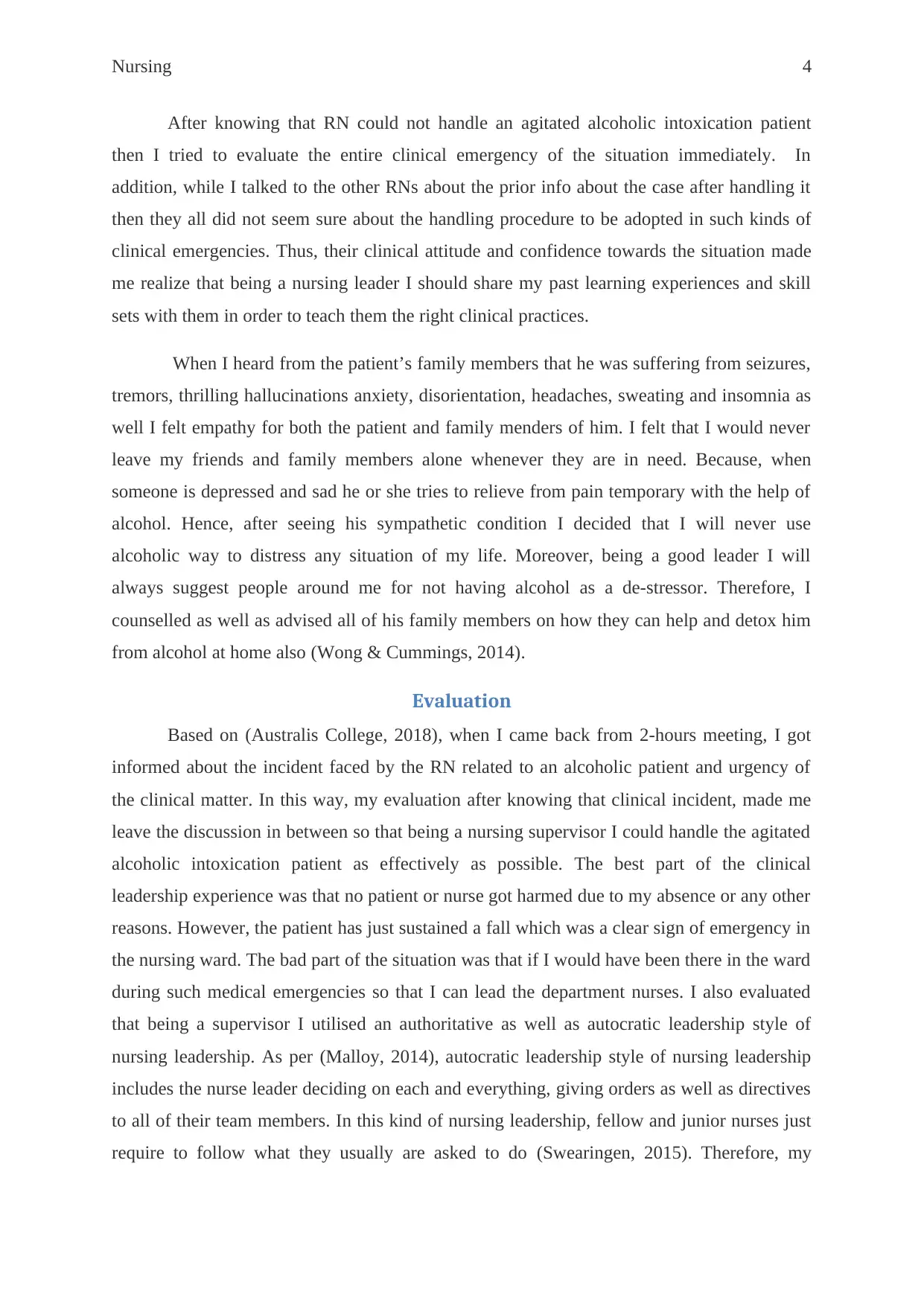
Nursing 4
After knowing that RN could not handle an agitated alcoholic intoxication patient
then I tried to evaluate the entire clinical emergency of the situation immediately. In
addition, while I talked to the other RNs about the prior info about the case after handling it
then they all did not seem sure about the handling procedure to be adopted in such kinds of
clinical emergencies. Thus, their clinical attitude and confidence towards the situation made
me realize that being a nursing leader I should share my past learning experiences and skill
sets with them in order to teach them the right clinical practices.
When I heard from the patient’s family members that he was suffering from seizures,
tremors, thrilling hallucinations anxiety, disorientation, headaches, sweating and insomnia as
well I felt empathy for both the patient and family menders of him. I felt that I would never
leave my friends and family members alone whenever they are in need. Because, when
someone is depressed and sad he or she tries to relieve from pain temporary with the help of
alcohol. Hence, after seeing his sympathetic condition I decided that I will never use
alcoholic way to distress any situation of my life. Moreover, being a good leader I will
always suggest people around me for not having alcohol as a de-stressor. Therefore, I
counselled as well as advised all of his family members on how they can help and detox him
from alcohol at home also (Wong & Cummings, 2014).
Evaluation
Based on (Australis College, 2018), when I came back from 2-hours meeting, I got
informed about the incident faced by the RN related to an alcoholic patient and urgency of
the clinical matter. In this way, my evaluation after knowing that clinical incident, made me
leave the discussion in between so that being a nursing supervisor I could handle the agitated
alcoholic intoxication patient as effectively as possible. The best part of the clinical
leadership experience was that no patient or nurse got harmed due to my absence or any other
reasons. However, the patient has just sustained a fall which was a clear sign of emergency in
the nursing ward. The bad part of the situation was that if I would have been there in the ward
during such medical emergencies so that I can lead the department nurses. I also evaluated
that being a supervisor I utilised an authoritative as well as autocratic leadership style of
nursing leadership. As per (Malloy, 2014), autocratic leadership style of nursing leadership
includes the nurse leader deciding on each and everything, giving orders as well as directives
to all of their team members. In this kind of nursing leadership, fellow and junior nurses just
require to follow what they usually are asked to do (Swearingen, 2015). Therefore, my
After knowing that RN could not handle an agitated alcoholic intoxication patient
then I tried to evaluate the entire clinical emergency of the situation immediately. In
addition, while I talked to the other RNs about the prior info about the case after handling it
then they all did not seem sure about the handling procedure to be adopted in such kinds of
clinical emergencies. Thus, their clinical attitude and confidence towards the situation made
me realize that being a nursing leader I should share my past learning experiences and skill
sets with them in order to teach them the right clinical practices.
When I heard from the patient’s family members that he was suffering from seizures,
tremors, thrilling hallucinations anxiety, disorientation, headaches, sweating and insomnia as
well I felt empathy for both the patient and family menders of him. I felt that I would never
leave my friends and family members alone whenever they are in need. Because, when
someone is depressed and sad he or she tries to relieve from pain temporary with the help of
alcohol. Hence, after seeing his sympathetic condition I decided that I will never use
alcoholic way to distress any situation of my life. Moreover, being a good leader I will
always suggest people around me for not having alcohol as a de-stressor. Therefore, I
counselled as well as advised all of his family members on how they can help and detox him
from alcohol at home also (Wong & Cummings, 2014).
Evaluation
Based on (Australis College, 2018), when I came back from 2-hours meeting, I got
informed about the incident faced by the RN related to an alcoholic patient and urgency of
the clinical matter. In this way, my evaluation after knowing that clinical incident, made me
leave the discussion in between so that being a nursing supervisor I could handle the agitated
alcoholic intoxication patient as effectively as possible. The best part of the clinical
leadership experience was that no patient or nurse got harmed due to my absence or any other
reasons. However, the patient has just sustained a fall which was a clear sign of emergency in
the nursing ward. The bad part of the situation was that if I would have been there in the ward
during such medical emergencies so that I can lead the department nurses. I also evaluated
that being a supervisor I utilised an authoritative as well as autocratic leadership style of
nursing leadership. As per (Malloy, 2014), autocratic leadership style of nursing leadership
includes the nurse leader deciding on each and everything, giving orders as well as directives
to all of their team members. In this kind of nursing leadership, fellow and junior nurses just
require to follow what they usually are asked to do (Swearingen, 2015). Therefore, my
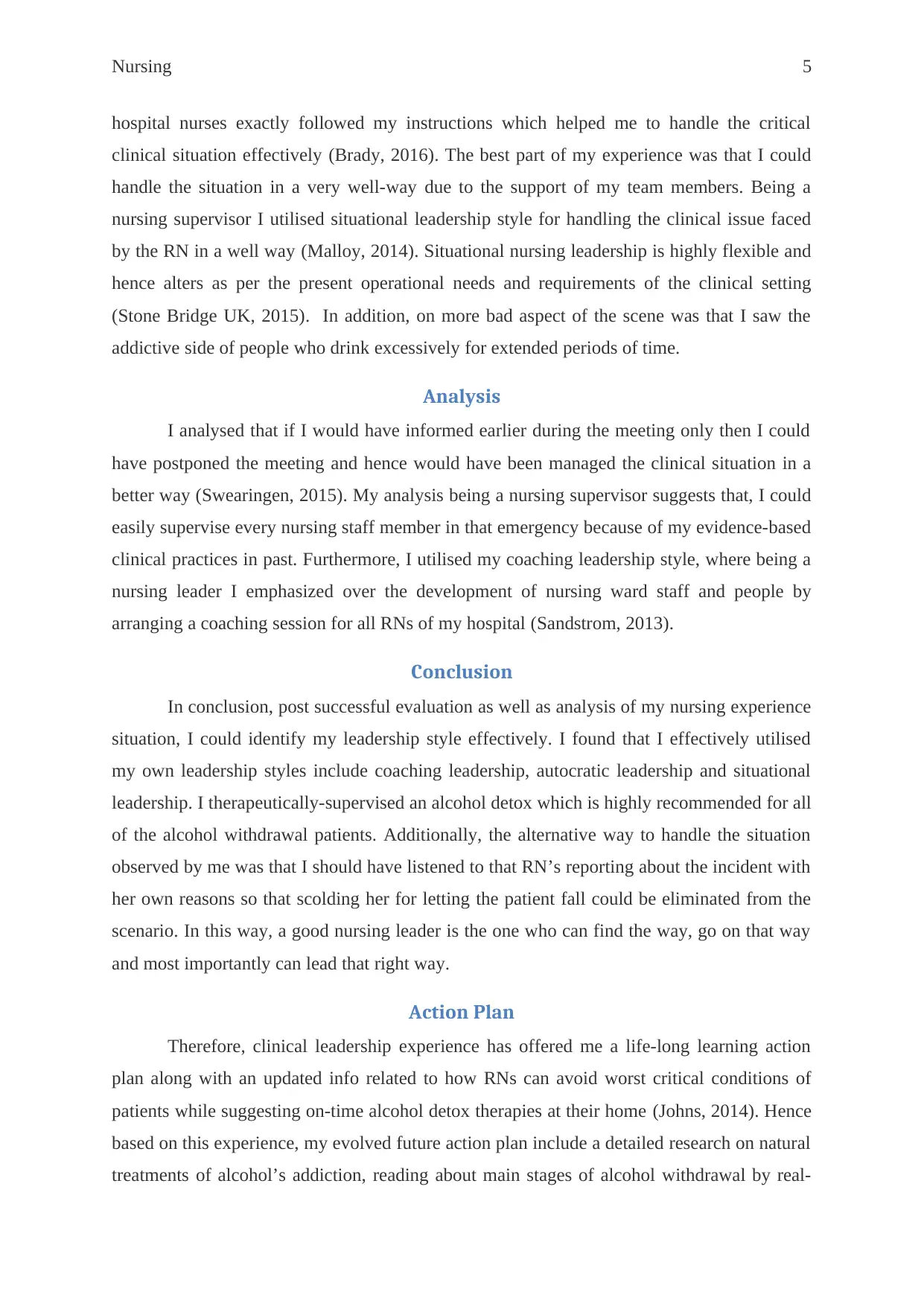
Nursing 5
hospital nurses exactly followed my instructions which helped me to handle the critical
clinical situation effectively (Brady, 2016). The best part of my experience was that I could
handle the situation in a very well-way due to the support of my team members. Being a
nursing supervisor I utilised situational leadership style for handling the clinical issue faced
by the RN in a well way (Malloy, 2014). Situational nursing leadership is highly flexible and
hence alters as per the present operational needs and requirements of the clinical setting
(Stone Bridge UK, 2015). In addition, on more bad aspect of the scene was that I saw the
addictive side of people who drink excessively for extended periods of time.
Analysis
I analysed that if I would have informed earlier during the meeting only then I could
have postponed the meeting and hence would have been managed the clinical situation in a
better way (Swearingen, 2015). My analysis being a nursing supervisor suggests that, I could
easily supervise every nursing staff member in that emergency because of my evidence-based
clinical practices in past. Furthermore, I utilised my coaching leadership style, where being a
nursing leader I emphasized over the development of nursing ward staff and people by
arranging a coaching session for all RNs of my hospital (Sandstrom, 2013).
Conclusion
In conclusion, post successful evaluation as well as analysis of my nursing experience
situation, I could identify my leadership style effectively. I found that I effectively utilised
my own leadership styles include coaching leadership, autocratic leadership and situational
leadership. I therapeutically-supervised an alcohol detox which is highly recommended for all
of the alcohol withdrawal patients. Additionally, the alternative way to handle the situation
observed by me was that I should have listened to that RN’s reporting about the incident with
her own reasons so that scolding her for letting the patient fall could be eliminated from the
scenario. In this way, a good nursing leader is the one who can find the way, go on that way
and most importantly can lead that right way.
Action Plan
Therefore, clinical leadership experience has offered me a life-long learning action
plan along with an updated info related to how RNs can avoid worst critical conditions of
patients while suggesting on-time alcohol detox therapies at their home (Johns, 2014). Hence
based on this experience, my evolved future action plan include a detailed research on natural
treatments of alcohol’s addiction, reading about main stages of alcohol withdrawal by real-
hospital nurses exactly followed my instructions which helped me to handle the critical
clinical situation effectively (Brady, 2016). The best part of my experience was that I could
handle the situation in a very well-way due to the support of my team members. Being a
nursing supervisor I utilised situational leadership style for handling the clinical issue faced
by the RN in a well way (Malloy, 2014). Situational nursing leadership is highly flexible and
hence alters as per the present operational needs and requirements of the clinical setting
(Stone Bridge UK, 2015). In addition, on more bad aspect of the scene was that I saw the
addictive side of people who drink excessively for extended periods of time.
Analysis
I analysed that if I would have informed earlier during the meeting only then I could
have postponed the meeting and hence would have been managed the clinical situation in a
better way (Swearingen, 2015). My analysis being a nursing supervisor suggests that, I could
easily supervise every nursing staff member in that emergency because of my evidence-based
clinical practices in past. Furthermore, I utilised my coaching leadership style, where being a
nursing leader I emphasized over the development of nursing ward staff and people by
arranging a coaching session for all RNs of my hospital (Sandstrom, 2013).
Conclusion
In conclusion, post successful evaluation as well as analysis of my nursing experience
situation, I could identify my leadership style effectively. I found that I effectively utilised
my own leadership styles include coaching leadership, autocratic leadership and situational
leadership. I therapeutically-supervised an alcohol detox which is highly recommended for all
of the alcohol withdrawal patients. Additionally, the alternative way to handle the situation
observed by me was that I should have listened to that RN’s reporting about the incident with
her own reasons so that scolding her for letting the patient fall could be eliminated from the
scenario. In this way, a good nursing leader is the one who can find the way, go on that way
and most importantly can lead that right way.
Action Plan
Therefore, clinical leadership experience has offered me a life-long learning action
plan along with an updated info related to how RNs can avoid worst critical conditions of
patients while suggesting on-time alcohol detox therapies at their home (Johns, 2014). Hence
based on this experience, my evolved future action plan include a detailed research on natural
treatments of alcohol’s addiction, reading about main stages of alcohol withdrawal by real-
⊘ This is a preview!⊘
Do you want full access?
Subscribe today to unlock all pages.

Trusted by 1+ million students worldwide
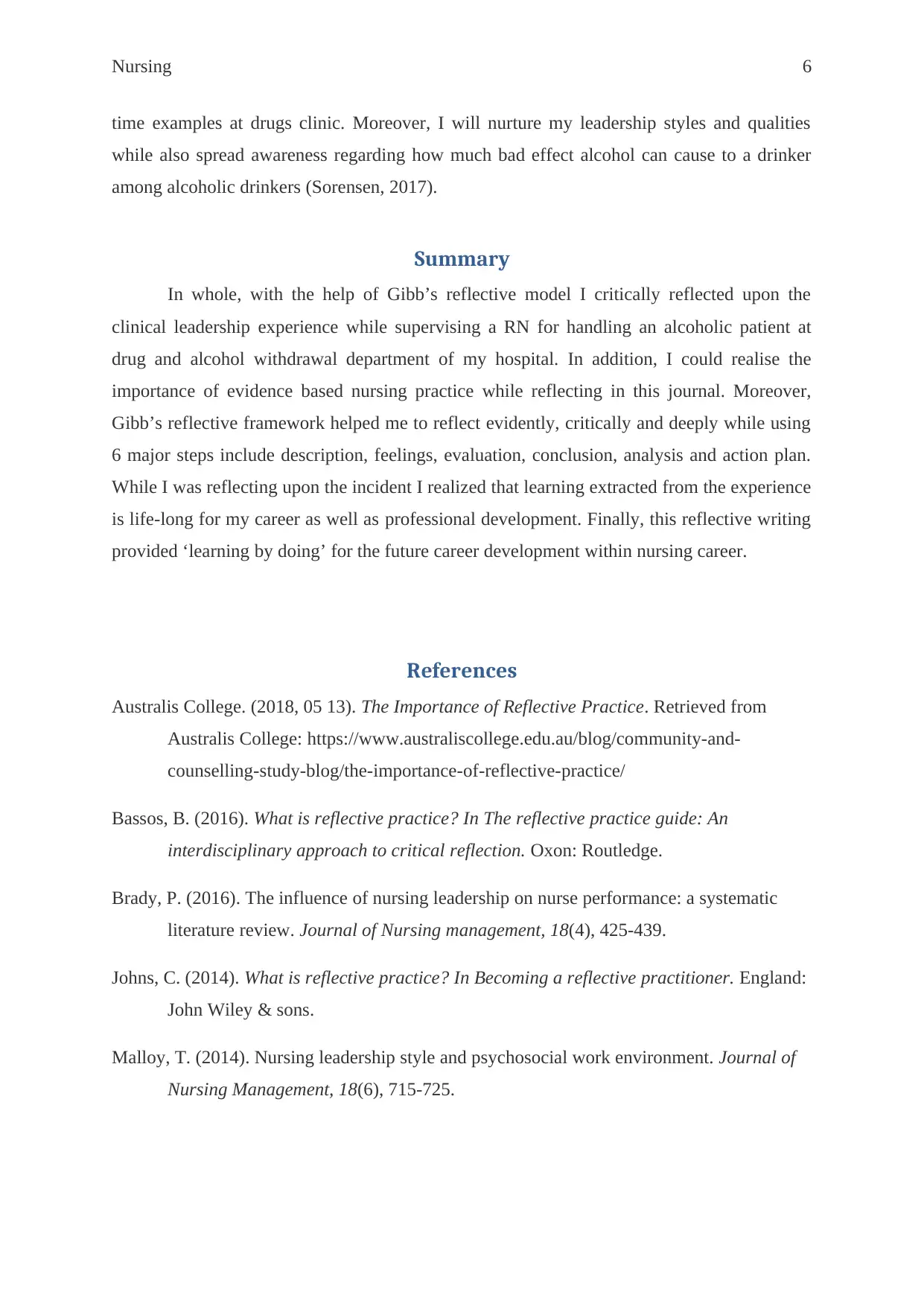
Nursing 6
time examples at drugs clinic. Moreover, I will nurture my leadership styles and qualities
while also spread awareness regarding how much bad effect alcohol can cause to a drinker
among alcoholic drinkers (Sorensen, 2017).
Summary
In whole, with the help of Gibb’s reflective model I critically reflected upon the
clinical leadership experience while supervising a RN for handling an alcoholic patient at
drug and alcohol withdrawal department of my hospital. In addition, I could realise the
importance of evidence based nursing practice while reflecting in this journal. Moreover,
Gibb’s reflective framework helped me to reflect evidently, critically and deeply while using
6 major steps include description, feelings, evaluation, conclusion, analysis and action plan.
While I was reflecting upon the incident I realized that learning extracted from the experience
is life-long for my career as well as professional development. Finally, this reflective writing
provided ‘learning by doing’ for the future career development within nursing career.
References
Australis College. (2018, 05 13). The Importance of Reflective Practice. Retrieved from
Australis College: https://www.australiscollege.edu.au/blog/community-and-
counselling-study-blog/the-importance-of-reflective-practice/
Bassos, B. (2016). What is reflective practice? In The reflective practice guide: An
interdisciplinary approach to critical reflection. Oxon: Routledge.
Brady, P. (2016). The influence of nursing leadership on nurse performance: a systematic
literature review. Journal of Nursing management, 18(4), 425-439.
Johns, C. (2014). What is reflective practice? In Becoming a reflective practitioner. England:
John Wiley & sons.
Malloy, T. (2014). Nursing leadership style and psychosocial work environment. Journal of
Nursing Management, 18(6), 715-725.
time examples at drugs clinic. Moreover, I will nurture my leadership styles and qualities
while also spread awareness regarding how much bad effect alcohol can cause to a drinker
among alcoholic drinkers (Sorensen, 2017).
Summary
In whole, with the help of Gibb’s reflective model I critically reflected upon the
clinical leadership experience while supervising a RN for handling an alcoholic patient at
drug and alcohol withdrawal department of my hospital. In addition, I could realise the
importance of evidence based nursing practice while reflecting in this journal. Moreover,
Gibb’s reflective framework helped me to reflect evidently, critically and deeply while using
6 major steps include description, feelings, evaluation, conclusion, analysis and action plan.
While I was reflecting upon the incident I realized that learning extracted from the experience
is life-long for my career as well as professional development. Finally, this reflective writing
provided ‘learning by doing’ for the future career development within nursing career.
References
Australis College. (2018, 05 13). The Importance of Reflective Practice. Retrieved from
Australis College: https://www.australiscollege.edu.au/blog/community-and-
counselling-study-blog/the-importance-of-reflective-practice/
Bassos, B. (2016). What is reflective practice? In The reflective practice guide: An
interdisciplinary approach to critical reflection. Oxon: Routledge.
Brady, P. (2016). The influence of nursing leadership on nurse performance: a systematic
literature review. Journal of Nursing management, 18(4), 425-439.
Johns, C. (2014). What is reflective practice? In Becoming a reflective practitioner. England:
John Wiley & sons.
Malloy, T. (2014). Nursing leadership style and psychosocial work environment. Journal of
Nursing Management, 18(6), 715-725.
Paraphrase This Document
Need a fresh take? Get an instant paraphrase of this document with our AI Paraphraser
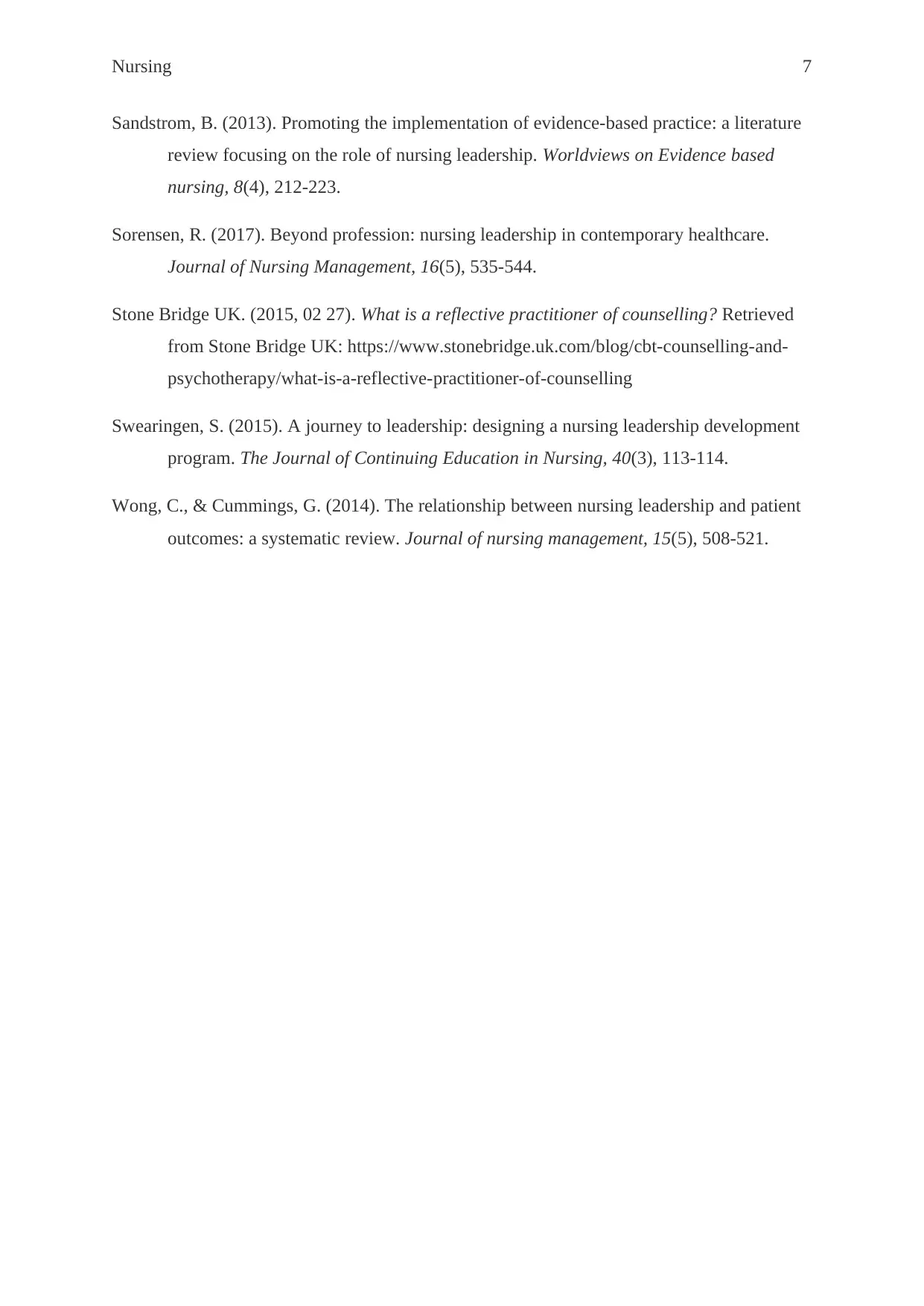
Nursing 7
Sandstrom, B. (2013). Promoting the implementation of evidence-based practice: a literature
review focusing on the role of nursing leadership. Worldviews on Evidence based
nursing, 8(4), 212-223.
Sorensen, R. (2017). Beyond profession: nursing leadership in contemporary healthcare.
Journal of Nursing Management, 16(5), 535-544.
Stone Bridge UK. (2015, 02 27). What is a reflective practitioner of counselling? Retrieved
from Stone Bridge UK: https://www.stonebridge.uk.com/blog/cbt-counselling-and-
psychotherapy/what-is-a-reflective-practitioner-of-counselling
Swearingen, S. (2015). A journey to leadership: designing a nursing leadership development
program. The Journal of Continuing Education in Nursing, 40(3), 113-114.
Wong, C., & Cummings, G. (2014). The relationship between nursing leadership and patient
outcomes: a systematic review. Journal of nursing management, 15(5), 508-521.
Sandstrom, B. (2013). Promoting the implementation of evidence-based practice: a literature
review focusing on the role of nursing leadership. Worldviews on Evidence based
nursing, 8(4), 212-223.
Sorensen, R. (2017). Beyond profession: nursing leadership in contemporary healthcare.
Journal of Nursing Management, 16(5), 535-544.
Stone Bridge UK. (2015, 02 27). What is a reflective practitioner of counselling? Retrieved
from Stone Bridge UK: https://www.stonebridge.uk.com/blog/cbt-counselling-and-
psychotherapy/what-is-a-reflective-practitioner-of-counselling
Swearingen, S. (2015). A journey to leadership: designing a nursing leadership development
program. The Journal of Continuing Education in Nursing, 40(3), 113-114.
Wong, C., & Cummings, G. (2014). The relationship between nursing leadership and patient
outcomes: a systematic review. Journal of nursing management, 15(5), 508-521.
1 out of 8
Related Documents
Your All-in-One AI-Powered Toolkit for Academic Success.
+13062052269
info@desklib.com
Available 24*7 on WhatsApp / Email
![[object Object]](/_next/static/media/star-bottom.7253800d.svg)
Unlock your academic potential
Copyright © 2020–2026 A2Z Services. All Rights Reserved. Developed and managed by ZUCOL.





